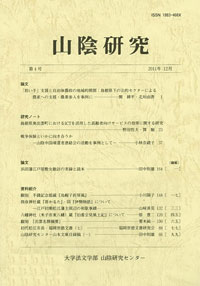島根大学法文学部山陰研究センター
ISSN:1883-468X

ダウンロード数 : ? 件
この文献の参照には次のURLをご利用ください : https://ir.lib.shimane-u.ac.jp/54301
山陰研究 14
2021-12-31 発行
鳥取方言における場所を表す助詞「カラ」
The locative particle kara in the Tottori dialect
長谷 早紀
島根大学法文学部卒業生
野間 純平
島根大学法文学部
ファイル
内容記述(抄録等)
鳥取方言では、「カラ」という格助詞が用いられるが、「学校カラ帰る」のように起点を表す用法だけでなく、「学校カラ勉強する」(「学校で勉強する」の意味)のように、場所を表す用法も存在する。本稿では、このようなカラが表す「場所」とは具体的にどのようなものであり、どのような条件でカラを使用することができるのか、調査をもとに記述した。そして、カラが表す「場所」とは、動作が行われる場所を指し、以下のような条件があることが明らかになった。
(I)カラ格名詞句が「トコロ性」と「物理性」を持つ
(II)述語動詞に何らかの「移動」が読み込める
この条件は、「起点」を表すカラの性質を引き継いだものと考えられる。また、同様に「場所」を表す「デ」との違いは、抽象的な「場所」や「範囲」を表せるか否かという点にある。
(I)カラ格名詞句が「トコロ性」と「物理性」を持つ
(II)述語動詞に何らかの「移動」が読み込める
この条件は、「起点」を表すカラの性質を引き継いだものと考えられる。また、同様に「場所」を表す「デ」との違いは、抽象的な「場所」や「範囲」を表せるか否かという点にある。
In the Tottori dialect, the particle kara is used as the locative marker (e.g., gakkoo kara benkyoo suru “study at school”) as well as the ablative marker (e.g., gakkoo kara kaeru “return from school”). This paper describes the conditions under which to use kara as the locative marker; these are as follows:
(i) The noun phrase that kara follows represents a concrete place (not “math class” but
“school”)
(ii) The predicate represents a movement
These conditions of locative kara are shared with ablative kara. In comparison with de, which also functions as a locative marker, locative kara has a narrower function. De can be also used with a noun phrase which represent an “abstract place,” and with a predicate which does not represent “movement.”
(i) The noun phrase that kara follows represents a concrete place (not “math class” but
“school”)
(ii) The predicate represents a movement
These conditions of locative kara are shared with ablative kara. In comparison with de, which also functions as a locative marker, locative kara has a narrower function. De can be also used with a noun phrase which represent an “abstract place,” and with a predicate which does not represent “movement.”
Other Article
